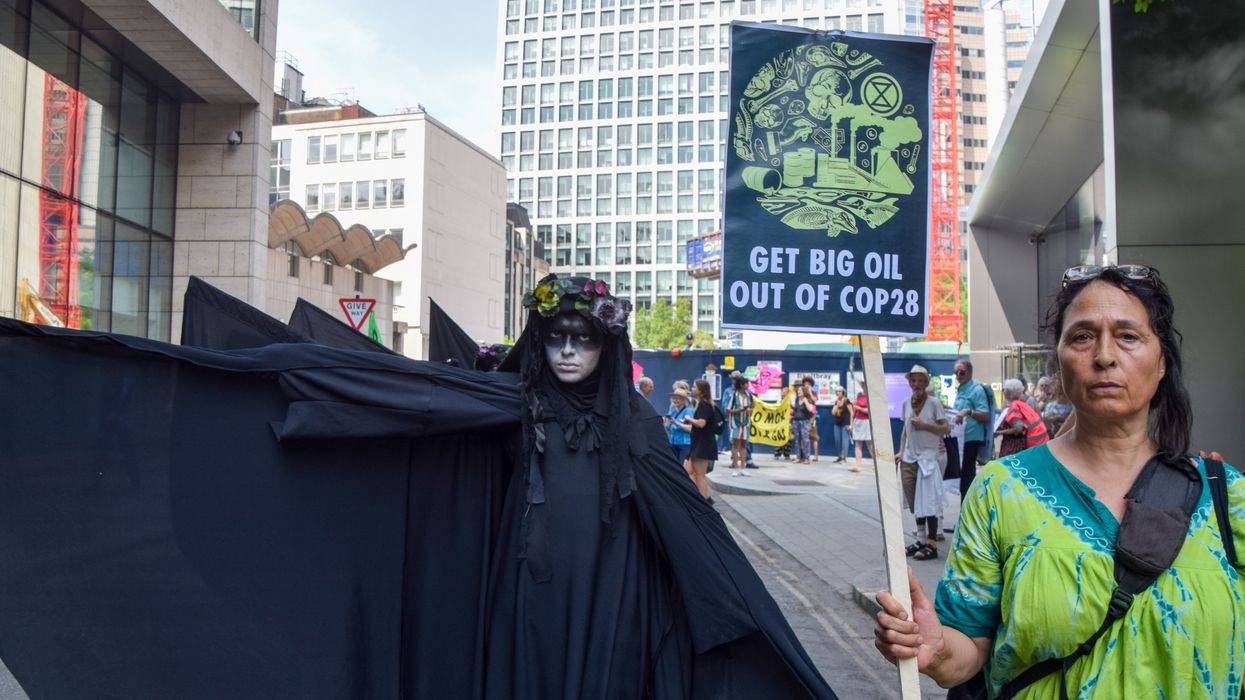Big Oil Stifling Democracy to Keep Burning Fossil Fuels
"The multinational $4 trillion fossil fuel industry has not only corrupted citizens' understanding of the climate crisis but also contributed to the erosion of democracy around the world."
As more people around the world demand an end to the fossil fuel era in the face of a worsening planetary emergency, Big Oil is "undermining democratic functions to stem the tide of climate action," a report published Tuesday revealed.
"Through a wide array of tactics, the multinational $4 trillion fossil fuel industry has not only corrupted citizens' understanding of the climate crisis but also contributed to the erosion of democracy around the world," the Center for American Progress (CAP) said in a new analysis.
CAP's Chris Martinez, Laura Kilbury, and Joel Martinez examined "what these tactics look like in practice and how they work against democratic systems to stifle climate action."
According to the authors, the three main democracy-destroying tactics are:
- Polluting democratic societies' information ecosystems with deception and false climate solutions;
- Using massive financial and lobbying influence over policymakers to defeat climate action and serve industry interests; and
- Directly undermining democratic rights and freedoms.
The fossil fuel industry is "stifling democratic rights through lawsuits, anti-protest laws, and voter suppression," the report states. Meanwhile, Big Oil greenwashes its harmful practices through direct advertising and via lobby groups like the American Petroleum Institute, which "regularly publicizes its member companies' investments in renewable energy and carbon reduction technologies."
"On closer inspection, however, industry's declared efforts to fight climate change fall woefully short, with oil and gas companies often devoting more attention to creating the appearance of working on climate solutions than actually developing them," the analysis contends.
Big Oil also uses the tactic of "astroturfing," or creating the appearance of grassroots support for policies and practices that are beneficial to the industry but harm the climate by perpetuating the fossil fuel era.
"The oil and gas industry's strategy is clear: Manipulate the levers of power to obstruct any climate policies that may reduce the world's reliance on fossil fuels," Martinez, CAP's associate director for domestic climate, said in a statement. "If left unchecked, these tactics stifle democratic rights, making governments more responsive to corporations than their own citizens."
The CAP analysis comes as a record 2,456 fossil fuel lobbyists flood the floors of the United Nations Climate Change Conference, or COP28, in Dubai, peddling influence and false climate solutions like so-called "abated" emissions, biofuels, and hydrogen.
"In the case of the [United Arab Emirates'] COP28 presidency, the industry capture of these spaces is complete, with a state-backed fossil fuel company threatening to interfere with multilateral climate progress at the highest and most consequential level," the report states, referring to summit president Sultan Ahmed Al Jaber, who is also the CEO of the UAE's national oil firm—and who has reportedly been using the run-up to the conference to pursue new fossil fuel deals.
"As warning lights of democratic backsliding strobe across the world and endanger critical efforts to address the climate crisis," the analysis adds, "the twin threat of the fossil fuel industry's attacks on climate action and the democratic functions necessary to take that action must not be ignored."
